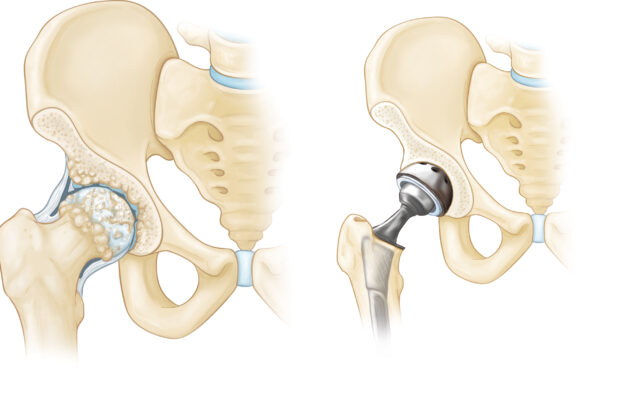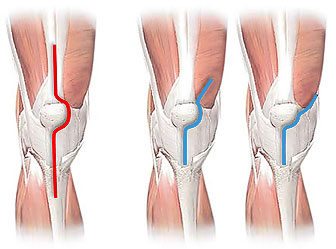Unicompartmental Knee Replacement: this is partial knee replacement which can be done for osteoarthritis patients with disease restricted to one part or one compartment of the knee. In it only the diseased part is replaced with plastic/metal.
The knee joint has 3 parts:
- Outside part or the lateral compartment
- Inside part of knee or the medial compartment
- Part between the knee cap and the thighbone or the patellofemoral compartment.
Benefits of partial knee replacement are multiple as the healthy ligaments, cartilage and bone structure are left untouched:
- Faster recovery
- Reduced pain post surgery
- Reduced bleeding
- Better mobilised/bending of knee
The one potential disadvantage of partial knee replacement is that the arthritis may develop in the other healthy parts of the knee requiring another surgery.
Selection of patients for surgery: right selection results in long term pain relief and functional lifestyle.
- Surgery is the final option when all other non – interventional methods are not fruitful and there is no pain relief.
- Dysfunctional knee is upsetting your daily normal activities & schedule
- Limited osteoarthritis to right compartment.
Doctors discourage this procedure in patients having considerable stiffness in knee, inflammatory arthritis and damage to ligament.
Pre surgery Orthopaedic Evaluation consists of various steps to ensure a beneficial knee surgery which includes taking of detailed medical history, comprehensive physical examination, and diagnostic imaging tests.
Surgery procedure:
Prior to surgery: commonly admission is done one day prior or same day for evaluations like – pre-anaesthetic check-up, routine fitness tests.
Surgical process: the surgery lasts anywhere from 1 – 2 hours. The procedure involves cutting an incision at the front of the knee, followed by exploration of the three knee compartments to check the extent of the disease to surrounding cartilage tissue if any. In case the damage is more, on the table the surgeon may decide to convert the procedure to total knee replacement. (Surgeon will discuss this with you prior to the surgery) With a special saw the surgeon then removes the diseased/damaged part. Femur and tibia ends are then capped with metal coverings. These are held together with the bone by cement and plastic is put between the metals for smooth movement.
Post surgery :patient is moved to post op recovery room and kept under monitor.
Complications from the surgery may be clotting of blood in the veins for which patient is put on blood thinners, possible infections are prevented by antibiotic course post surgery. Also during surgery sometimes, there may be an injury to surrounding nerves or vessels. Other possible risks are continued pain and anaesthesia associated risks.
Recovery from surgery constitutes a detailed plan. In a uni-compartmental knee replacement as the incision done is smaller and healthy components are retained the hospitalization duration is short and the patient returns to their normal lifestyle sooner. Patient is commonly discharged within 2-3 days post this surgery and has less post-operative pain, reduced swelling and easier physical therapy rehabilitation. Routine daily activities can commonly be resumed within 6 weeks post surgery if the post operative medication, physical therapy schedule is followed.
Dr L Tomar is highly expert surgeon in Unicompartmental Knee Replacement Surgery, practicing in Delhi for more than two decades




